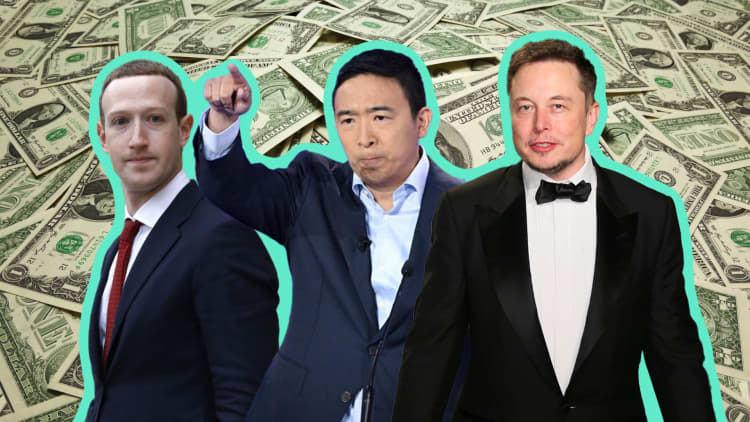Multi-billionaire Mark Zuckerberg says that while it can be "unreasonable" how much wealth individuals can amass, it also "may be optimal" for society at large if the alternative is governments controlling all of the wealth.
In an employee question and answer session live-streamed on Thursday, a Facebook employee asked Zuckerberg to offer his perspective on Sen. Bernie Sanders's comment that billionaires should not exist.
"I understand where he's coming from," Zuckerberg, who is currently worth $69.5 billion according to Bloomberg's Billionaire Index, said.
"I don't know if I have an exact threshold on what amount of money someone should have but at some level no one deserves to have that much money. I think if you do something that is good, you get rewarded, but I do think some of the wealth that can be accumulated is unreasonable."
Zuckerberg and his wife, Priscilla Chan, have pledged to give away 99% of their Facebook shares through the Chan Zuckerberg Initiative (CZI) over their lifetime, and "there are people who would even say even that is bad, right?" Zuckerberg said.
"We are funding science, for example. And some people I think would say, 'Well, is it fair that a group of wealthy people get to — to some degree — choose which science projects get worked on,'" Zuckerberg said.
Indeed, some experts have argued that through philanthropy, the rich have a disproportionate or unfair influence on society, and one even called it "plutocratic."
Though Zuckerberg told employees "I don't know how to answer that exactly," he said, "at some level it is not fair, but it may be optimal," he said, "…or better than the alternative. The alternative would be the government chooses all of the funding for all of the stuff."
Zuckerberg uses the example of the National Institutes of Health (NIH). The NIH invests nearly $39.2 billion "in medical research for the American people" annually, according to its website, and of that money more than 80% is awarded through almost 50,000 competitive grants to more than 300,000 researchers at more than 2,500 universities, medical schools and other research institutions all around the world.
As a governmental agency, the NIH has to distribute grant money widely and carefully. But private money can be invested in large sums and on risky bets, says Zuckerberg.
"Part of what makes progress happen is people taking different approaches to different things. And I think that the NIH is generally funding a lot of great work … but I also think it is pretty good that there are other people out there who are trying different approaches, who are willing to fund things and maybe take a bet," he says. "I think you want a mix of public and private [funding] on all of this."
Were all funding for large projects distributed through the government, that would "deprive the market and world" of a variety of ways to tackle problems, Zuckerberg said.
"I think you can think at the same time both that it is unfair that any individual might have that much wealth, yet still think it is better for everyone that there is certain choices and competition of the ideas that get to get pushed out there," Zuckerberg said.
To be sure, not everyone sees billionaires as good for society.
Famous French economist Thomas Piketty, for example, proposes in his new book "Capital and Ideology" (out in the U.S. in March), taxing billionaires out of existence because, broadly speaking, they hamper economic growth.
Per capita income growth has fallen in the United States as the number of billionaires has exploded, Pikketty says.
"Reaganism [low taxes and small government] has begun to justify any concentration of wealth, as if the billionaires were our saviors," Piketty told French magazine L'Obs in September. But "Reaganism has shown its limits: Growth has been halved, inequalities have doubled. It is time to break out of this phase of sacredness of property. To overcome capitalism."
Mark Zuckerberg: If I didn't have complete control of Facebook, I would have been fired
Nearly 68% of the world's richest people are 'self-made,' says new report

Like this story? Subscribe to CNBC Make It on YouTube!


